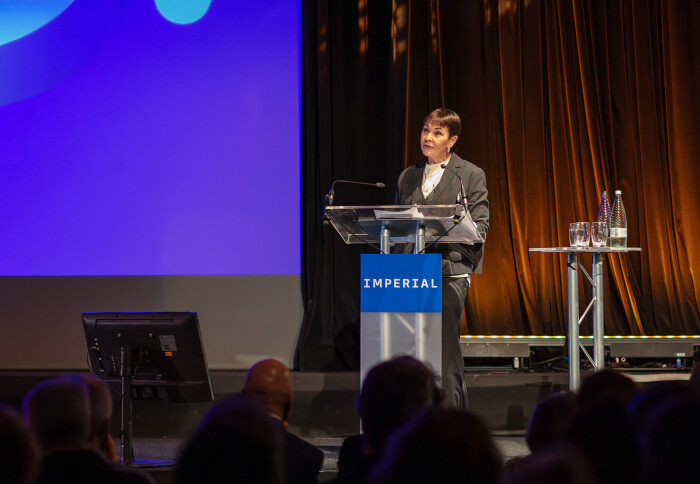Caroline Lucas warns of twin attacks on climate and democracy

The rise of populism and the acceleration of the nature and climate emergencies are becoming increasingly interlinked, Caroline Lucas has warned.
Delivering the 2024 Grantham Institute Annual Lecture at Imperial College London, the former MP and Green Party leader said that far-right parties around the world were weaponising the climate issue to sow discord and argued that tackling climate change and challenging populism were ‘the same battle’.
“If it is to be successful and sustainable, climate action requires precisely the nationwide investment, democratic renewal, community resilience and active hope which are also the strongest antidotes to the economic hardship, insecurity, and inequality that drive the search for the simplistic answers and scapegoating of others which fuel the populist right,” she told the audience at Imperial’s Great Hall.
The highest price is being paid, as always, by the world’s poorest and most marginal communities, especially women and girls, who are least responsible and often least equipped to respond. Caroline Lucas
Lucas called for a UK counterpart to America’s Inflation Reduction Act to fully invest in the green transition and spoke of the need to defend and renew democracy by involving citizens, highlighting proposals for a proportional voting system, greater use of citizens’ assemblies and radical devolution to local regions and authorities.
In her lecture, she also explored the potential of climate adaptation to build community resilience:
“While high level efforts towards climate mitigation can sometimes seem diffuse and remote, adaptation is – by definition – more focussed, local, and tangible. It has the capacity to transform climate concern from the status of an abstract belief to a lived reality: something we do together, every day.
“And in so doing, it builds agency, dismantling the view that we are powerless in the face of the vastness of climate breakdown, and crucially gives agency and choice back to local people.”

Climate justice
Caroline Lucas was joined on stage by Professor Tahseen Jafry, Director of the Mary Robinson Centre for Climate Justice at Glasgow Caledonian University; Zamzam Ibrahim, co-founder of SOS-UK; and Jon Alexander, co-founder of the New Citizen Project, for a discussion chaired by Alyssa Gilbert, Grantham Institute Director of Innovation and Director of Undaunted.
 Reacting to the lecture, Professor Jafry acknowledged the importance of agency, which she described as “fundamental to our ability to make progress” on climate-related issues. She also called for a fair and just transition that is meaningful for people in both the Global North and the Global South.
Reacting to the lecture, Professor Jafry acknowledged the importance of agency, which she described as “fundamental to our ability to make progress” on climate-related issues. She also called for a fair and just transition that is meaningful for people in both the Global North and the Global South.
“We know historically that those who have benefited from the emissions are those in the Global North and those in the Global South are now experiencing the brunt of the climate crisis and extreme weather. My concern is that the transition will be dependent on the extraction, the mining, the minerals, the resources that will come from the Global South,” she said.
Agents of change
Jon Alexander argued that the climate crisis and the rise of populism are both symptoms of a “collapse of story” whereby individuals are considered consumers rather than citizens.
 “What we have today is a ‘consumer’ democracy, where people’s only agency is to choose between a fixed set of options every few years, and where we’re assumed and even encouraged to make that choice on the basis of individual self-interest.
“What we have today is a ‘consumer’ democracy, where people’s only agency is to choose between a fixed set of options every few years, and where we’re assumed and even encouraged to make that choice on the basis of individual self-interest.
“In the context of climate, we’ve been stuck in this story of individual behaviour change as the greatest thing anyone can do when it’s not. True agency is always collective,” he said.
The importance of community – both local and global – was also highlighted by Zamzam Ibrahim, who spoke about the power of the youth climate movement and the disconnect that many communities feel from their elected representatives.
“To me, the most impactful work comes from the grassroots, from local community,” she said. “One of the things that the climate youth movement did incredibly well is mobilise collectively with people who are angry about the same thing.”
The event also included remarks by Professor Sir Brian Hoskins, Chair of the Grantham Institute at Imperial. Watch the event in full.
Article text (excluding photos or graphics) © Imperial College London.
Photos and graphics subject to third party copyright used with permission or © Imperial College London.
Reporter
Conor McNally
The Grantham Institute for Climate Change